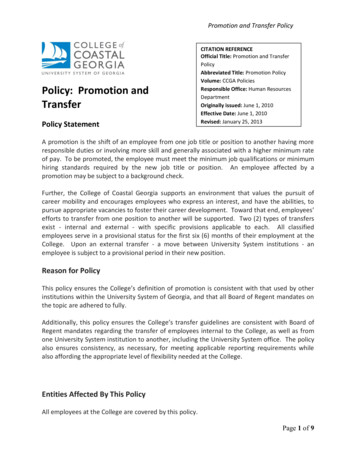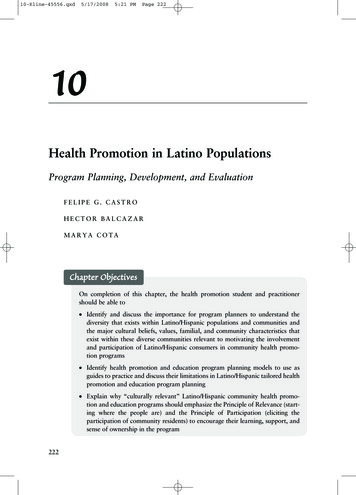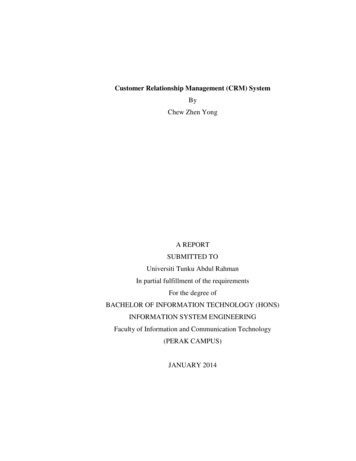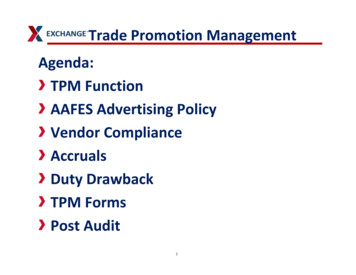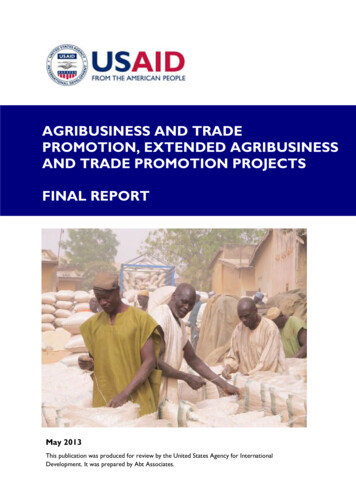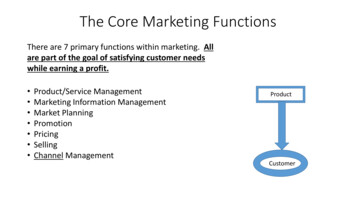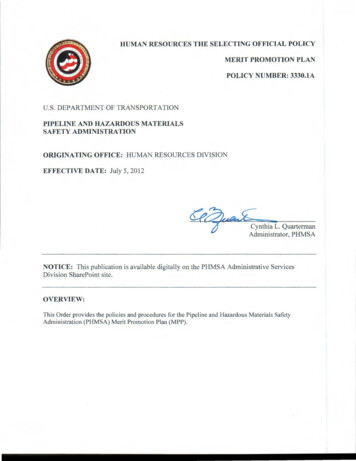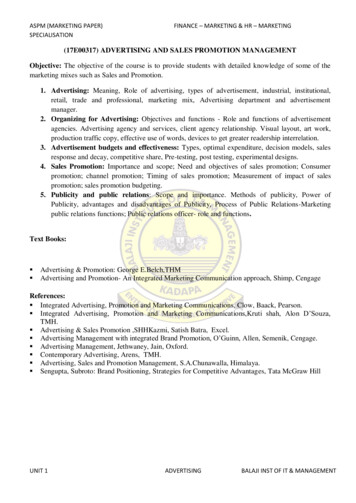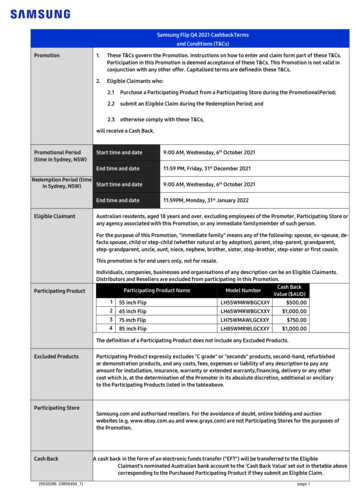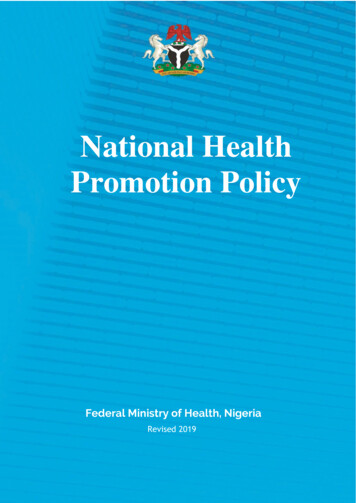
Transcription
National HealthPromotion PolicyFederal Ministry of Health, NigeriaRevised 2019
NATIONAL HEALTH PROMOTION POLICYFEDERAL MINISTRY OF HEALTH, NIGERIARevised 2019National Health Promotion Policyi
FOREWORDAvailable evidence indicates that Health Promotion is an effective tool for galvanisingindividual and collective health actions aimed at preventing diseases, improving thehealth and wellbeing of the populace as well as ensuring a healthier society for all. Infurtherance of the Federal Government of Nigeria’s stewardship role of improving thehealth of the Nation, the first edition of the National Health Promotion Policy (2006) andthe Strategic Framework for its Implementation (2007) were developed to strengthenthe Health Promotion capacity of the National Health System.The review of the National Health Promotion Policy (2006) is a major step towardseffective re-positioning of health promotion in Nigeria. The process provided Nigeria’sfrontline health promotion managers, practitioners and technical assistants a strategicopportunity to examine the evolution of health promotion in Nigeria over the pastthirteen years and the findings suggest that the key reasons for the underperformanceinclude a weak road map and process for translating the National Health PromotionPolicy (2006) into interventions; weak management structures, weak health promotionsystems and infrastructure across the three tiers of government; usurpation of healthpromotion functions by programmes, projects, other sectors and sub-sectors indisregard of the policy; and non-prioritization of health promotion by the political class.This 2019 revised National Health Promotion Policy sets standards and providesaccurate guidance on best practices and what should be done by decision makers,managers and service providers of health promotion at various levels. The revisedpolicy further identifies the relevant human resource necessary to implement healthpromotion activities effectively and efficiently by expanding the skills-base of HealthPromoters to include persons with the minimum required qualifications and skills in linewith global best practice. It aims to ensure that health promotion steps out of its lesssuccessful past. That way, it can become a formidable contributor to the achievementof the health-related Sustainable Development Goals, as well as the Universal HealthCoverage; thereby improving the health and wellbeing of the Nigerian populace.Rolling out and implementing this revised National Health Promotion Policy (2019) willentail strengthening our planning and review systems. Strategic and AnnualOperational plans for health promotion, including a variety of guidelines will need to bedeveloped urgently.We count on the partnership, buy-in and continuous support of all stakeholders in thepublic and private sectors, including the development and implementing partners, nongovernment and civil society organizations, professional associations, regulatorybodies, academia, research institutions, traditional and religious institutions, and mediafor successful repositioning of Health Promotion programming in Nigeria.Professor Isaac F. Adewole, FAS, FSPSP, FRCOG, DSc (Hons)Honourable Minister of HealthFebruary, 2019National Health Promotion Policyii
ACKNOWLEDGEMENTThe revised National Health Promotion Policy is a product of the combined efforts offrontline, strategic, allied and collaborative stakeholders. The Federal Ministry of Health(FMoH) is appreciative of their specific and collective inputs.We are particularly grateful to members of the National Health Promotion Forum, theteam of resource persons and representatives of Federal Ministries, Departments,Agencies (MDAs) and Parastatals; State Ministries of Health, Agencies and theFederal Capital Territory Secretariat for Health and Human Services.We appreciate several strategic partners who provided technical and financial supportfor revising this policy until this final product evolved. These partners include the UnitedNations Children’s Fund (UNICEF), DfID-funded Maternal New born and Child Health(MNCH2) Programme, Nigerian Urban Reproductive Health Initiative (NURHI 2),Centre for Communication and Social Impact (CCSI) and the World HealthOrganisation (WHO). Others are the USAID funded Breakthrough ACTION-Nigeria(BA-N), Society for Family Health (SFH), Marie Stopes International, Ipas, ClintonHealth Access Initiative (CHAI) and Pathfinder International. Not left out are allies suchas the Christian Association of Nigeria (CAN), Nigerian Inter-Faith Action Association(NIFAA), Development Communications Network (DevComs) and many more.The coordination of the review process under the leadership of Mrs. Ladidi K.Bako-Aiyegbusi (Director and Head, Health Promotion Division), Mrs. Patricia Freeman(former Head, Health Promotion Division); and other members of the Health PromotionDivision is commendable. Your hard work, commitment and dedication towards movingHealth Promotion programming in Nigeria to the next level are highly appreciated.Dr. Adebimpe Adebiyi, mniDirector, Family Health DepartmentNational Health Promotion Policyiii
ABBREVIATIONS AND PPNIFAANMCNNPHCDANSHDP IINSPNURHI 2OAUSBCSBCCSDGsSFHUHCUNFPAUNICEFUNNWHOAnnual Operational PlansBreakthrough Action NigeriaBehaviour Change CommunicationChristian Association of NigeriaCommunity Based OrganizationCentre for Communication and Social ImpactCentre for Disease ControlClinton Health Access InitiativeCommunity Health Influencers, Promoters and ServicesDepartment for International DevelopmentFederal Capital TerritoryFederal Radio Cooperation of NigeriaFederal Road Safety CommissionFederal Ministry of HealthHealth EducationHealth PromotionHealth Promotion DivisionHealth Promotion and EducationInformation Communication and TechnologyLocal Government AreaLocal Government CouncilMinistries, Departments and AgenciesMaternal, New Born and Child Health Programme 2National Council on HealthNon-Governmental OrganisationNational Health Promotion ForumNational Health Promotion PolicyNigeria Inter-Faith Action AssociationNursing and Midwife Council of NigeriaNational Primary Health Care Development AgencyNational Strategic Health Development Plan IINational Strategic PlanNigerian Urban Reproductive Health Initiative 2Obafemi Awolowo UniversitySocial and Behaviour ChangeSocial and Behaviour Change CommunicationSustainable Development GoalsSociety for Family HealthUniversal Health CoverageUnited Nation Population FundUnited Nations Children’s FundUniversity of Nigeria, NsukaWorld Health OrganizationNational Health Promotion Policyiv
TABLE OF CONTENTSForeword . . iiAcknowledgement . . . iiiAbbreviations and Acronyms . ivTable of Contents . . vCHAPTER 11.0 Background, Policy Context, Development and Review 11.1 Background . .11.2 The Context of the Health Promotion Policy . .11.3 Policy Development and Review . . 2CHAPTER 22.0 Policy Statement, Guiding Principles and Values . . . . 42.1 Policy Statement . . . . 42.2 Guiding Principles and Values 42.2.1 Government Accountability and Responsibility . . 42.2.2 Equality, Equity and Social Inclusion 42.2.3 Ethics . 52.2.4 Professionalism . 52.2.5 Efficiency 52.2.6 Regulation and Legislation . 52.2.7 Community Ownership . 52.2.8 Multi-dimensional Collaboration .5CHAPTER 33.0 Goal, Broad Objectives and Action Points . 73.1 Goal . . . . 73.2 Broad Objectives and Action Points . . . 7CHAPTER 44.0 Institutional Arrangements, Coordination Platform, Roles & Responsibilities.704.1 Institutional Arrangement . .104.1.1 National Health Promotion Division, Federal Ministry of Health .1104.1.2 State Health Promotion Division, State Ministry of Health . .1114.1.3 LGA Health Promotion Unit, Primary Health Care Department . .1114.2 Health Promotion Coordination Platforms . .1224.2.1 National Level: National Health Promotion Forum 1224.2.2 State Level: State Health Promotion Forum .144.2.3 LGA Level: LGA Health Promotion Forum .144.2.4 Ward Level: Ward Health Promotion Committee . 14CHAPTER 55.0 Policy Implementation Process, Documents and Resources .155.1 Policy Implementation Process and Documents . 155.1.1 National Strategic Plan for Health Promotion 155.1.2 Federal and State Annual Operational Plans and LGA Work Plans . 155.2 Resources for Health Promotion . 165.2.1 Human Resources: Staffing and Management . . 165.2.2 Materials and Infrastructures . . 175.2.3 Funding . . . 17CHAPTER 66.1 Policy Monitoring and Evaluation . 19APPENDIXAppendix I: Stakeholders Roles and Responsibilities .20Appendix II: List of Contributors and Consultants . . . 25National Health Promotion Policyv
CHAPTER ONE1.0 BACKGROUND, POLICY CONTEXT, DEVELOPMENT AND REVIEW1.1 BackgroundNigeria is the most populous country in Africa with an estimated population of over 198 millionin 2018, which is estimated to grow to 210 million by 2021 based on a growth rate of 3.2%(NPC 2018). Nigeria is a federation of 36 states and a Federal Capital Territory, Abuja as thenational capital. There are 774 Local Government Areas (LGAs) distributed across 6 geopolitical zones. The Nigerian 1999 Constitution (as amended) guarantees the right to health. ANational Health Policy (NHP) 2016 provides the compass for the country’s health system; whilethe National Health Act (2014) provides a framework for the regulation, development andmanagement of the health system as well as set standards for rendering health services in thefederation (NSHDP II 2018).The Nigerian Government developed the National Health Promotion Policy (NHPP) in 2006 tostrengthen the health promotion capacity of the National Health System to deliver health carethat is promotive, protective, preventive, restorative and rehabilitative to every citizen of thecountry. However, the implementation of the NHPP (2006) was affected by some challengessuch as weak intersectoral collaboration, weak management structures, poor infrastructure,and limited understanding of the concept of health promotion and consumer rights at all levels.These gaps, current trends in Health Promotion practices as well as emerging and re-emerginghealth issues of public health importance informed the revision of the 2006 edition and resultedin the NHPP 2019.A Health Promotion Division exist at the Federal Ministry of Health and in each State Ministryof Health while the Local Government Areas (LGAs) operates Health Promotion Units. AcrossNigeria, there are community structures such as Ward Development Committees, VillageDevelopment Committees and Health Facility Committees. The responsibilities of thesecommittees include demand creation, monitoring of the accessibility and quality of healthservice delivery, community mobilization, and participation in health programmeimplementation, among others. However, these committees are often neither empowered noradequately involved in the design and planning of interventions and are therefore unable tocarry out their mandate within the community. Hence, the communities are often not able tohold the government and service providers accountable. However, in isolated cases where thecommittees are supported, they have proven to be instrumental in increasing demand forservices (NHP 2016).1.2 The Context of the Health Promotion PolicyThe National Health Policy (NHP) 2016 recognizes that Nigeria is saddled with an unbearableburden of Communicable and Non-Communicable Diseases (NCDs). This is coupled withissues such as low levels of health literacy, poor sanitation and inadequate attention to keysocial determinants of health. The revised NHPP (2019) is meant to contribute to achievingNigeria’s National Health Policy commitment; to deliver health care that is preventive,promotive, protective, restorative and rehabilitative to every citizen of the country.Due to globalization and other factors, the country is experiencing drastic changes inconsumption patterns of alcohol, food and tobacco. Disease patterns are changing with moreNational Health Promotion Policy1
people affected by cancers, diabetes and hypertension. Mental health conditions, road trafficaccidents, domestic violence, unsafe sex and insufficient physical activity are also on the rise.Other threats to the Nigerian populace include insecurity, floods, Lassa fever, Ebola, Cholera,Polio and Avian Influenza (NHP 2016).Over the years, Nigeria’s spending in the Health Sector has not fully met the 15 per centcommitment set out in the Abuja Declaration of 2001 whereby the African Union MemberStates committed to allocating at least 15% of annual national budget to health. The healthinequities encountered reflects the linkage between peoples’ health, their economic status andsocial conditions among states in Nigeria. This is responsible for almost all causes of illnessand mortality driven by political, economic and social forces; thereby further complicating theinability of government to adequately address the social determinants of health. It is againstthis backdrop that health promotion becomes invaluable.Health Promotion is defined in the Ottawa Charter (1986) as the process of enabling people toincrease control over, and to improve their health. It moves beyond a focus on individualbehaviour towards a wide range of social and environmental interventions (WHO). There isgrowing evidence globally that Health Promotion is a pre-requisite for economic developmentbecause Health Promotion interventions makes positive contribution to the improvement ofhuman health. It is a cost-effective approach which facilitates increased individual, family,community and social participation in health. It promotes wellbeing through the adoption ofpositive lifestyles by all, as well as disease prevention. It increases the use of available healthservices by combining approaches of equity, multi-sectoral collaboration, partnerships,alliances and networks. Health Promotion offers practical approaches to ensuring equal accessto health through promotion of lawful, financial, economic and targeted environmentalinterventions. Hence, Health Promotion promotes high quality of life, healthy productivepopulation with reduced morbidity, mortality and expenditure on health leading to resultantbenefit of a prolonged life span.Over the years, Health Promotion in Nigeria has remarkably evolved from purely HealthEducation-focused to a more holistic and inclusive era of promoting health and preventingdiseases. As Nigeria experiences a demographic transition resulting in increased demand ona fragile health system, the country requires a vibrant, robust and sustained Health Promotionsystem. Deliberate efforts are required to integrate health interventions within a multi-sectoralcontext, addressing the broader determinants of health, promoting healthy lifestyles, andgalvanizing health actions by individuals, families, communities and the entire populations.1.3 Policy Development and ReviewIn 2006, the Health Promotion Division of the Family Health Department, Federal Ministry ofHealth (FMoH), developed the National Health Promotion Policy (NHPP). The process wassupported by the World Health Organization (WHO) in collaboration with other developmentpartners. The draft Policy was approved and adopted at the 49th National Council on Health(NCH) in 2006, and launched at the 50th NCH on 11th January 2007.In 2017, the Federal Ministry of Health in collaboration with relevant Stakeholders commencedthe review of the NHPP (2006) after more than a decade of implementation as well as emergingnew trends in Health Promotion practices. Three meetings were held between June 2017 andMarch 2018, which produced the first draft of the revised National Health Promotion Policy(NHPP).National Health Promotion Policy2
In April 2018, the FMoH with support from the DFID-funded Maternal Newborn and ChildHealth (MNCH 2) programme, and in collaboration with National Health Promotion Forumorganized a five-day meeting to further review the first draft of the revised Policy document.The output of the meeting, the second draft revised NHPP was presented to stakeholders inJune 2018 at the 61st NCH for further input and buy-in.In July 2018, the FMoH with support from the UNICEF and NURHI 2 and in collaboration withthe National Health Promotion Forum and other stakeholders organised a three-day meetingto validate the revised NHPP which was approved and adopted at the 62nd NCH held in Asaba,Delta State from 9th to 13th September, 2019.National Health Promotion Policy3
CHAPTER TWO2.0 POLICY STATEMENT, GUIDING PRINCIPLES AND VALUES2.1 Policy StatementThe Federal Government of Nigeria (FGN) recognizes Health Promotion as an essentialcomponent to achieving the highest level of health and development of individuals, families,households and communities across Nigeria. Health Promotion interventions will beadequately resourced and deployed to effectively address the increasing burden of diseases,other public health challenges and social determinants of health.The management and implementation of Health Promotion in Nigeria will be consistent withthe National Health Act (2014), National Health Policy (2016) and other health-related policies;Resolutions of the World Health Assemblies, Regional Strategy for Health Promotion,Sustainable Development Goals (SDGs) and other international frameworks and bestpractices.Across the tiers of government, Health Promotion programmes shall be led by qualified HealthPromotion specialists, complemented by a variety of cadres and experts as may be required.All Health Promotional interventions including materials to be administered on the Nigerianpublic MUST satisfy the underlisted minimum standards: Conform to the approved procedure for development of health promotion materials Be sensitive to religion, culture and gender Be conducted based on evidence including accurate data and information Be audience and geographically specific Be relevant to the issue it aims to address Have a Call to Action2.2 Guiding Principles and ValuesThe National Health Promotion Policy (2019) is underpinned by the following principles andvalues:2.2.1 Government Accountability and ResponsibilityAll levels of government have a responsibility and are accountable for protecting, maintainingand improving the health of its citizens; as health is a global public good. The pursuance of thisresponsibility comes with the need to mainstream Health Promotion as a major component ofefforts aimed at the delivery of social services, development and environmental sustainability.2.2.2 Equality, Equity and Social InclusionPeople have a right to equal opportunities and to good health and well-being. Interventionsmust take cognizance of generic, cross-cutting as well as the special needs of the underreached and vulnerable members of the population; regardless of socio-economic status,gender, religion, ethnicity, literacy, race and location. Consequently, approaches determinedby issues, population and settings must be carefully thought through, balanced andappropriately applied.National Health Promotion Policy4
2.2.3 EthicsAll interventions will endeavour to engender respect, justice and fairness for persons orbeneficiaries, end users and their rights.2.2.4 ProfessionalismNigerians deserve the best that government and other entities, including professionals andservice providers can offer. The outputs of Health Promotion interventions must aim at goldstandards and best practices. Quality Assurance, Monitoring and Evaluation will ensureoptimal outcomes.2.2.5 EfficiencyThe design and implementation of interventions must aim at maximizing value for all theresources invested. Assigned responsibilities and roles must be delivered at the appropriatelevels and by qualified persons. Actions must be driven by evidence, innovation, quality andresults.2.2.6 Regulation and LegislationHealth Education, Sensitization, Communication, Community Mobilisation and Advocacy areundoubtedly effective in their own rights as strategies for influencing human behaviour. Hence,health promotion interventions shall be regulated and legislated to ensure achievement ofHealth Promotion outcomes.2.2.7 Community OwnershipThe role of individuals, families and communities are fundamental for preventing diseases,improving health and wellbeing as well as ensuring a healthy society. As communities aredynamic and differ, improving health literacy will be targeted based on the needs of entities,target groups and communities. Efforts shall be geared towards progressing from participationto ownership and sustainability.2.2.8 Multi-dimensional CollaborationThis Policy recognizes the invaluable positive roles and immense contributions of thecommunity, the Private Sector, Non-Governmental Organizations (NGOs), InternationalOrganizations and all other Donor Agencies in disease prevention, improving health andwellbeing as well as taking measures that ensure a healthy society.As indicated in Figure 1 on page 6, the diversity of players has been classified into five majorstakeholder groups: The Nigerian populace, Frontline, Strategic, Allied and Collaborative. Thecomprehensive roles and responsibilities of various players shall be as outlined in Appendix I.National Health Promotion Policy5
FrontlinestakeholdersStrategicstakeholders Policy makers, managers andservice providers across the healthsector (public and private) Office of the Head of Civil Service Federal Ministry of Finance, Budget andNational Planning Development Agencies andImplementing Partners Academia, Research, Regulatory andProfessional bodies and their institutions National Health Promotion Forumand coordination structures atNational, State, LGA, Ward andCommunity levelsNigerian populaceAlliedstakeholders MediaTelecommunication InstitutionsFinancial InstitutionsCivil Society OrganisationsNGOs, FBOs and CBOsTechnical ies, Departments and Agencies(other than health) across the tiers ofgovernmentFigure 1: Stakeholders for Health Promotion in NigeriaNational Health Promotion Policy6
CHAPTER THREE3.0 GOAL, BROAD OBJECTIVES AND ACTION POINTS3.1 GoalTo empower the Nigerian populace to take timely actions in disease prevention, improving theirhealth and wellbeing as well as taking measures that ensure a healthy society.3.2 Broad Objectivesa) Foster health promotion interventions targeted at addressing social determinants ofhealth, reducing inequities, and tackling priority burden of diseases in Nigeriab) Facilitate health promotion interventions in support of Government’s efforts directed atensuring and sustaining healthy behaviour, healthy lifestyle, and enabling environmentincluding healthy public policy.c) Enhance human resource and capacity strengthening for the delivery of healthpromotion interventions.d) Strengthen systems to monitor, evaluate and manage evidence related to healthpromotion interventions.3.2.1 Objective OneTo foster health promotion interventions targeted at addressing social determinants ofhealth, reducing inequities, and tackling priority burden of diseases in NigeriaAction pointsi.Advocate for the development of appropriate policies, protocols, standards andregulatory practices, to ensure health equity within the populace focusing on thepoor, vulnerable groups and people living with disability.ii.Participate in periodic Maximum Pressure Campaigns (MPC) activities to addressprevalent disease conditions and for prioritised national programmes such asimmunisation, family planning, malaria, leprosy, tuberculosis, onchocerciases, viralhaemorrhagic diseases, substance abuse and screening programmes forNoncommunicable diseases such as hypertension, diabetes and cancers.iii.Support health promotion interventions that: strengthen legislation, regulation and taxation of unhealthy commodities strengthen the functionality of the community health systems such as WardDevelopment Committee, Village Development Committee, Health FacilityManagement Committee, etc for effective participation in decision makingand ownership of health promotion activities promote health literacy and prevent the spread of Communicable and NonCommunicable Diseases promote reproductive health that increases access and utilization of healthservices (family planning, antenatal care, Sexually Transmitted Infections,etc) that prevent and address determinants of reproductive health such ashygiene, legal aids against gender based violence including female genitalmutilation, women empowerment and encouragement of safer sexpractices.National Health Promotion Policy7
promote appropriate behaviours and safety measures to reduce accidentsand injuries at work, home, school and on the roadimprove food safety and security at household, institution and communitylevelspromote intersectoral action with responsible agencies to take appropriatemeasures for environment and public health thereby protecting thepopulation from negative practices such as discharge of wastes into waterbodies and in backyard farms, and the overuse of pesticides that affecthuman healthincrease access to health services by significant reduction of structural,system and societal barriers especially for the vulnerable groups3.2.2 Objective TwoTo facilitate Health Promotion interventions in support of Government’s efforts directed atensuring sustainable healthy behaviour, healthy lifestyle and enabling environment includinghealthy public policiesAction pointsi.Set up mechanisms for increasing awareness and understanding of global andnational initiatives such as Sustainable Development Goals (SDGs) and UniversalHealth Coverage (UHC) for Health Promotion practitioners at all levels.ii.Mainstream health promotion across sectors and facilitate stronger collaborativework and dialogue among diverse partners and health providers to address healthpromotion related complex challenges for the attainment of healthy lifestyles.iii.Employ a systems approach to provide technical leadership in the mainstreamingof preventive, promotional and protective health behaviour into School Healthprogramming targeted at students, management, staff, parents and the widercommunity. Interventions must be holistic; ranging from inclusion in school curriculato promoting a culture of healthy schools.iv.Put in-place an effective media strategy to include social and new media therebyensuring effective engagement with media institutions and platforms to raiseawareness about population health gradient and potential actions to be takenthereby promoting positive reinforcement of healthy behaviour and lifestyle.v.Commit Ministry of Finance, Budget and Planning to make inclusion of HealthPromotion in intervention proposals a priority requirement for the approval ofDevelopment/Donor Agency interventions in Nigeria.vi.Promote positive behavioural measures to: reduce maternal, newborn, child and adolescent morbidity and mortalityincluding child and orphan support. improve childcare practices including uptake of immunization, exclusivebreastfeeding and additional feeding (complementary). improve the health promotion component of School Health Programme at alllevels of education. encourage healthy lifestyle changes along life course in all settings such ashealthy choices (e.g. diet, exercise). reduce Non Communicable Disease risk factors such as smoking and alcoholintake as well as abstaining from the use of mood-altering substances (e.g.drugs).National Health Promotion Policy8
improve responsible consumption of Medicines; encourage compliance withtreatment schedules prescribed by health workers, and support for actions tocontrol the sale of fake and over-the-counter medicines.encourage people across different sectors to enrol in national, state andcommunity-based health insurance scheme.reduce health risk cause by climate crisis, emergencies, disease outbreaks andenvironmental hazards.3.2.3 Objective ThreeTo enhance human resource and capacity strengthening for the delivery of health promotioninterventionsAction pointsi.Develop a clear framework for transforming and scaling up staff capacitystrengthening including data base of Health Promotion specialistsii.Enhance competency-based capacity building in Health promotion at all levelsiii.Design and establish Continuous Professional Education mechanisms includingcertification for Health Promotersiv.Secure buy-in of the policy with National Universities Commission (NUC) and otherstrategically relevant Agenciesv.Establish a Community of Practice for Health Promoters3.2.4 Objective FourTo strengthen systems to implement, monitor, evaluate and manage evidence related HealthPromotion interventions.Action pointsi.Institutionalize the production of the full suite of operational documents connectedto the National Health Promotion Policy.ii.Secure budget lines and dedicated trust fund for Health Promotion at each of thethree tiers of government.iii.Set up a National Health Promotion Data Bank and reactivate the Zonal Data Banksiv.Develop and operationalise a routine data collection and reporting system at alllevels.v.Establish monitoring, evaluation and documentation mechanisms for generating
Operational plans for health promotion, including a variety of guidelines will need to be . Society for Family Health (SFH), Marie Stopes International, Ipas, Clinton Health Access Initiative (CHAI) and Pathfinder International. Not left out are allies such . Nigeria is a federation of 36 states and a Federal Capital Territory, Abuja as the
